White Papers
Welcome to the ESS Tech, Inc. (ESS) white paper library. Our white papers tackle a variety of complex issues that utilities, independent power producers, project developers, and other large energy users face, including energy security, grid stability, renewable integration and more.
Long- duration energy storage is essential to providing the reliability and resiliency we need when the sun is not shining and the wind is not blowing.
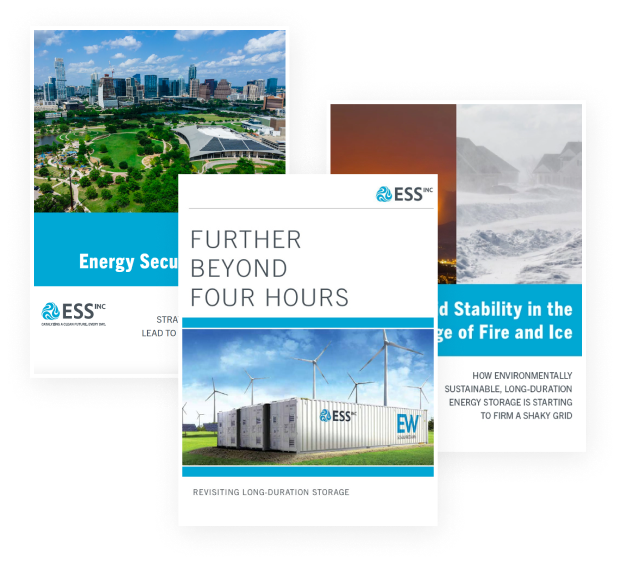
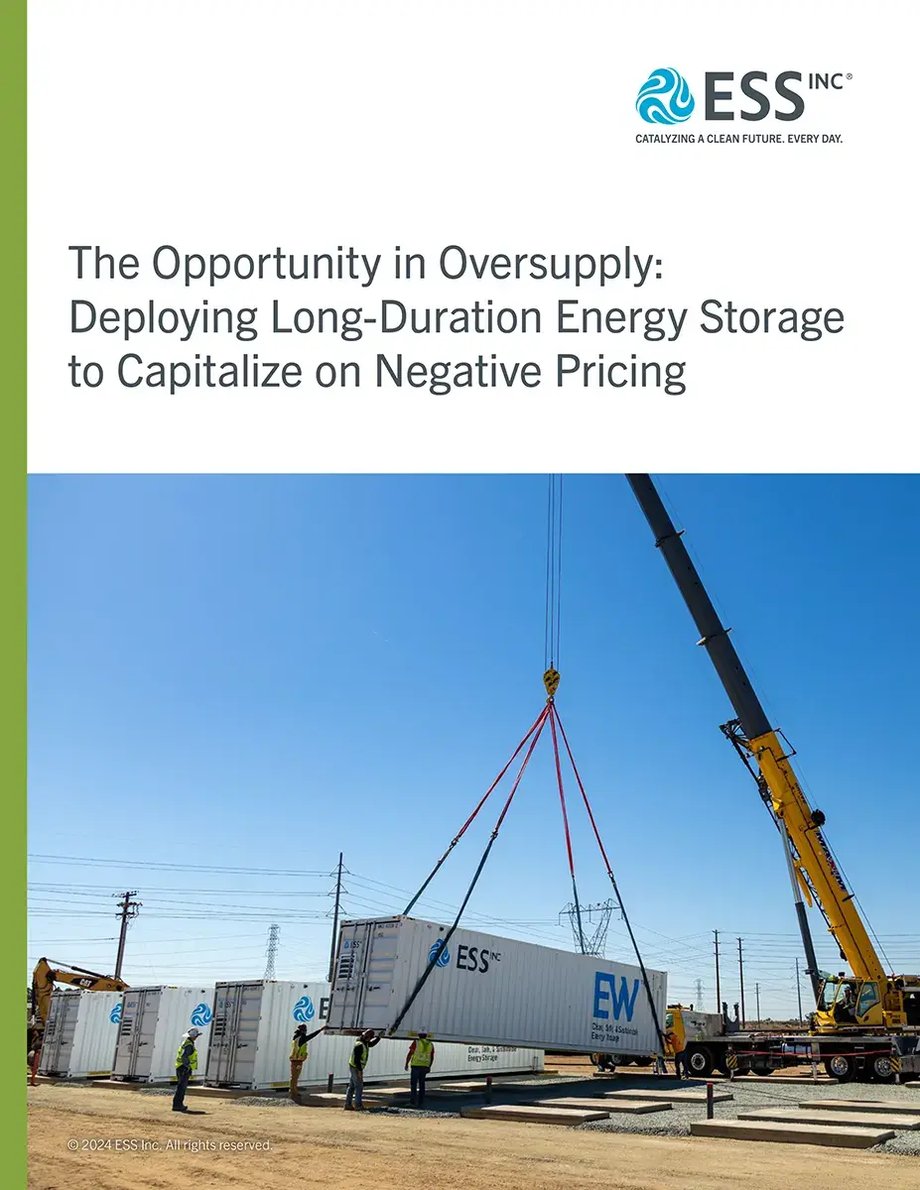
The Opportunity in Oversupply:
Deploying Long-Duration Energy Storage to Capitalize on Negative Pricing
As more renewables are added to the grid and periods of localized grid congestion increase, negative energy prices will become an enduring challenge for generators and utilities. New battery technologies can help. With long design-life, operational flexibility and unlimited cycling, projects powered by ESS IFB technology can capitalize on negative pricing and offer attractive returns compared to lithium-ion technology in affected regions.

A California Plan:
How California Leads Decarbonization
California has long been a leader in the clean energy transition. But today, the state sits at a crucial crossroads. The early success of renewable energy deployment is creating headwinds to continued progress. High prices, energy shortages during periods of peak demand, curtailments, and the increasing threat of Public Safety Power Shutoffs all amid increasing climate-driven disasters such as heatwaves, wildfires, floods and drought, are raising concerns about the costs and reliability of the state’s energy system. But, there is a path forward that builds on the state’s early success by incorporating new technologies, such as long-duration energy storage, which can quickly enable the deep decarbonization of the Golden State’s energy system while delivering reliability and resiliency in the face of climate threats. Learn more about how reforms to existing systems and new technologies can continue to enable California to continue to lead the global clean energy transition.
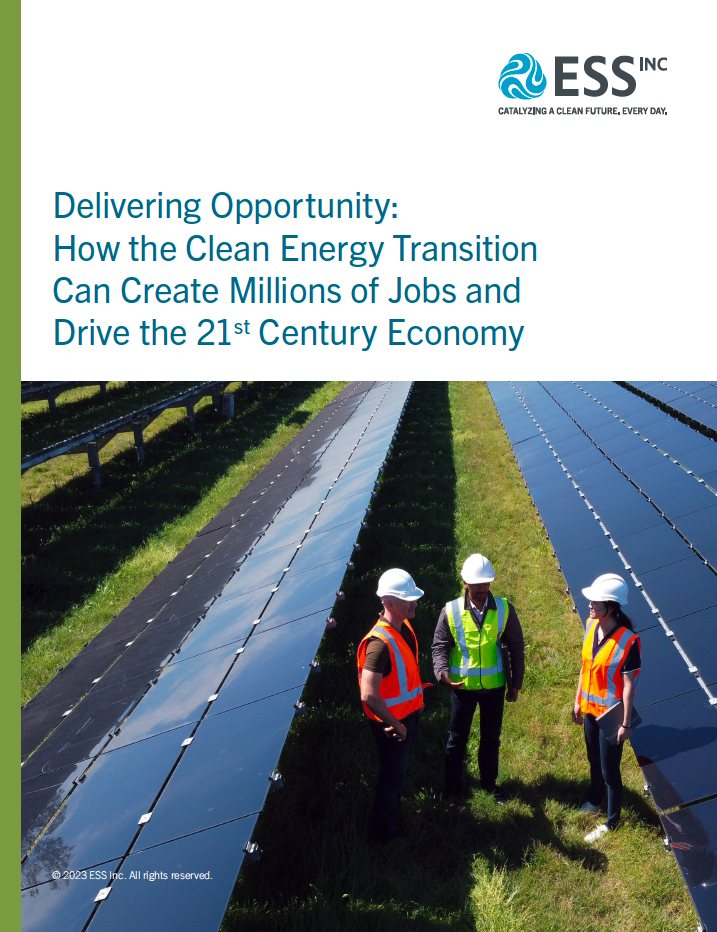
Delivering Opportunity: How the Clean Energy Transition Can Create Millions of Jobs and Drive the 21st Century Economy
The global energy economy is undergoing a radical transformation. Energy systems, technologies, and economic models which developed over the past 150 years are now rapidly evolving from year to year. Meanwhile, advancements in clean energy technology and the urgent need to address climate change are combining to drive deep decarbonization of the global economy.
This transition has the potential to deliver substantial economic benefits and opportunities to people and communities across the United States. In this white paper, ESS provides a discussion of the opportunities that recent legislation, such as the Inflation Reduction Act, and new technologies, such as long-duration energy storage, stand to unleash, and some of the challenges that remain to realizing a prosperous clean energy future.

LDES: the key to making the most of zero-carbon electricity
ESS, in partnership with Citizens for Responsible Energy Solutions and the U.S. Energy Association released an issue brief detailing the critical need for long-duration energy storage (LDES) to create an efficient, low-carbon energy system and avoid the curtailment of renewable energy resources. The brief which analyzes curtailment data from grid operators nationwide, illustrates the mismatch between renewable energy supply and grid demand and demonstrating the need for long-duration energy storage to decarbonize the energy system.
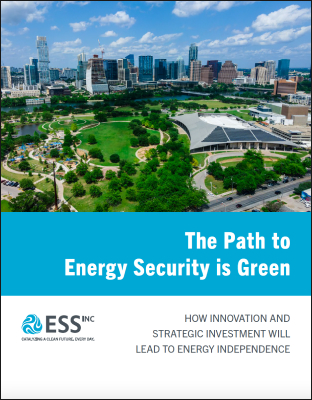
The Path to Energy Security is Green
Reliance on fossil fuels has long created energy insecurity, and today we also face new threats from extreme weather, cyberattacks on energy infrastructure and unstable energy supply chains. To truly achieve energy independence, we need to create a resilient energy system powered by renewable energy and built using flexible supply chains that do not rely upon politically unstable regions of the world. This transformation should be backed by a strategic transition plan, government/industry collaboration and investment in innovation.
This is not a distant possibility; technologies commercially available today can underpin this transition to a clean, resilient energy system. Learn more in this latest white paper how innovation and strategic investment will lead to energy independence.
Grid Stability in the Age of Fire and Ice
The difficulties plaguing the grid that left millions of people without power in early 2021 have not gone away. In fact, the Electric Reliability Council of Texas, which manages the Texas grid, reported in July 2021 that there had already been 1,280 unplanned summer outages.
The latest ESS white paper, Grid Stability in the Age of Fire and Ice: How Environmentally Sustainable, Long-Duration Energy Storage is Starting to Firm a Shaky Grid, explains why ESS long-duration iron flow batteries that use safe, earth-abundant and recyclable materials are best positioned to drive market growth in renewables, stabilize the grid and address climate change in the years ahead.
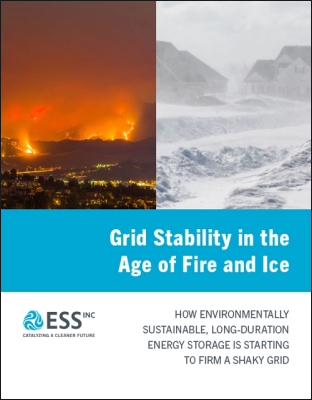

Life Cycle Analysis of the ESS Inc.
Iron Flow Battery
Reliance on fossil fuels has long created energy insecurity, and today we also face new threats from extreme weather, cyberattacks on energy infrastructure and unstable energy supply chains. To truly achieve energy independence, we need to create a resilient energy system powered by renewable energy and built using flexible supply chains that do not rely upon politically unstable regions of the world. This transformation should be backed by a strategic transition plan, government/industry collaboration and investment in innovation.
This is not a distant possibility; technologies commercially available today can underpin this transition to a clean, resilient energy system. Learn more in this latest white paper how innovation and strategic investment will lead to energy independence.
Further Beyond 4 Hours: Revisiting
Long-Duration Storage
Key findings include:
- Long-duration storage is now commonly viewed as having a delivery time of at least four hours, and the need for it is growing.
- Renewable energy self-consumption is seen as the most promising application for long-duration storage. But many other applications, from backup power to short-term operating reserves, were also cited, highlighting the potential for revenue stacking.
- The most promising technology for long-duration storage is flow batteries and the key criterion for selecting a given asset is cost, particularly the level of capital expenditure required.


Beyond 4 Hours: The Transition to a More Flexible, Valuable, Long-Duration
Storage Asset
Key findings include:
- Smart storage purchasers are beginning to look beyond capital expense to more effective measures of lifetime cost and flexibility.
- Long-duration storage’s capability to seamlessly integrate energy and power applications.
- Long-duration storage’s ability to provide substantial flexibility in dealing with ever-changing regulatory and legislative landscapes, not to mention commercial volatility.
Long-Duration Energy Storage for California’s Clean, Reliable Grid
- ESS was part of a select group of CESA members to contribute to the ground-breaking study: Long-Duration Energy Storage for California’s Clean, Reliable Grid.
- California alone will need to increase its long-duration energy storage capacity by deploying 2-11 GW by 2030, and 45-55 GW by 2045.
- Significant procurement activities for long-duration storage need to happen before 2025 to ensure that California has a sufficient pipeline of long-duration storage projects to meet future grid needs.
- Regulatory changes could unlock the value of energy storage beyond 4-hours and
The flexibility that comes with long-duration storage can strengthen a grid that is increasingly being populated with “use-limited” assets.










